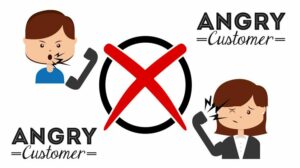Sunny Dhami of RingCentral shares ten simple tips and techniques for handling an angry customer phone call.
As a call centre representative or manager, chances are you probably receive an angry phone call at least once a day. It could be an irate caller complaining about a bill. Or even an angry caller getting frustrated about call times (with 75% of customers believing call waiting times to be too long, this is probably a regular issue). Whatever the reason, it can be a frustrating experience all around.
When spoken to rudely and aggressively by irate customers, it can be hard to be polite and helpful in response. However, if a call isn’t handled well, there is a high chance that the customer won’t return. If this happens daily, that is a lot of non-returning customers. And a lot of revenue missed out on.
Of course, it can be difficult to push through the negativity. But it is very possible! With the right training, tools, and software, every phone call can be a great phone call, meaning call centre agents can handle calls with grace and decorum every time.
De-escalating an angry phone call leads to customer satisfaction, which in turn leads to a more productive call, shorter handle times, great customer service, and overall better results.
The Cost of an Angry Caller
According to Salesforce, 74% of people are likely to switch brands if they feel the buying phase to be too difficult. A big part of this is the way that a customer service representative handles a call. Therefore, if a caller is treated well, then the customer is more likely to stay with the brand.
It isn’t just that one customer that may not return if their anger doesn’t fade. If an angry caller isn’t satisfied, the first thing they will do will be to leave a bad review. Or leave a raging complaint on social media. This means anyone who sees the review will also be put off your firm.
Whether you are a small or large company, the way a customer perceives you is everything. Forbes reports that in 2018, bad customer service cost businesses a massive $75 billion a year. That puts coping with customers’ anger in a bit of perspective.
Even if you aren’t bothered about the company’s revenue, handling a call badly can lead to gross misconduct. Meaning you, or your staff, can lose their job over it. And as the Call Centre Management Association reports that call centre turnover rates are around 26% annually, this is certainly a space that can be improved on.
10 Ways to De-escalate an Angry Phone Call
So, to avoid any negativity, here are 10 different ways that angry phone calls can be de-escalated and handled using good customer service.
1. Stay Calm
It’s no good if both the caller and call centre staff are getting angry. So, the first thing that needs to be done when dealing with an angry phone call is to stay calm.
Remember, angry phone calls aren’t personal. It’s annoying, but the customer is just aiming their anger at whoever happens to pick up the phone.
Therefore, a representative must do what they can to remain calm and give an angry caller customer service that will turn their frown upside down.
A good tip is to try and deal with an issue before it gets worse. Not taking things to heart will enable people to deal with the problem effectively.
2. Pick Your Words Wisely
You and your staff should always think about how you would like to be spoken to and the words that you would like to hear.
For example, if you are speaking to an angry woman, the last thing she will want to hear is you saying: “Alright, calm down, love!” Not only is this patronizing and sexist, but it will just make her even more wound up.
A good idea is to consider the personality type of the customer and use the language suited to the scenario. An angry businessman or businesswoman, for instance, must be dealt with differently from an irate consumer.
Some people just want someone to vent to. They probably have a lot going on in their personal life. Unfortunately for you, that unexpected bill from your company is the thing that tipped them over the edge. Here, it’s important to respond using empathetic language.
Try responding with phrases like: “I’m sorry you feel this way,” Or: “May I suggest …”
A customer with a legitimate problem has a reason to be annoyed at your company. Your firm is in the wrong and needs to acknowledge this and take them seriously. Therefore, the language used for this angry phone call should again be empathetic and apologetic.
Try saying things like: “I’m so sorry to hear about this.” Or: “I will action this for you right away.”
Dealing with an abusive customer can be particularly hard. Nobody should be expected to put up with angry customers being openly unpleasant to them.
However, you should still try to calm the client down. Professional language should always be used in this scenario and the emotional side of things should also be understood.
Try saying: “I understand your concern, but we don’t tolerate the kind of language you are using.” Or: “You seem very upset; would you like to continue this conversation through email?”
When dealing with an angry phone call, it’s best to use positive language. Such as “yes”, “definitely”, “understand”, and “recommend”. All of this will help give the customer a positive experience.
3. Let the Customer Talk
Often, all a customer wants to do is get things off their chest. For whatever reason, they feel they have been wronged and they want to rant. Let them do so.
It might even be that a situation has become a bit complicated and they just need a chance to get things clear in their heads. Nobody likes being interrupted or second-guessed. So, just let them get their point across.
Granted, it can be a bit hard to catch what a person is saying if they are on a cell phone or are speaking to you from a coffee shop. Therefore, it’s a good idea to make notes where possible and let the person talk.
Of course, if they are a difficult customer, then there may be a point that they need to be cut off. But otherwise, try to listen to what they are saying. Once they have calmed down, ask them questions that will help get to the root cause of the issue.
4. Consider Your Way of Speaking
The tone of voice can be everything when dealing with an angry caller. Overly gentle and it can come across as patronizing. Not gentle enough, and it can seem like you don’t care. Making either of these mistakes can exacerbate the situation.
Having a steady and calm voice will help calm things down. Apologizing when needed will show that you take the situation seriously. And using a soft tone will show empathy to the situation.
Remember to always stay neutral when talking to customers. Part of angry caller customer service is never to respond to rude comments in kind. A man screaming down the phone won’t react well if you yell back.
It’s really important never to mock a caller. Angry or not. Because in any scenario, that’s just rude.
5. Try Not to Put Them on Hold
As a customer call agent, it can be very tempting to put angry callers on hold. Nobody wants yet another angry phone call to ruin their day. Some even believe going on hold will give the person a chance to calm down.
But putting a frustrated person on hold can just make the situation worse. It leads to people feeling like they are being ignored. Some might even feel that agents are complaining about them. It’s a bit like the call centre way of saying: “Talk to the hand.” Basically, in their eyes, you aren’t listening to them and you seemingly don’t care.
Instead of putting them on hold, use the phone conversation to let them know what you are doing to deal with the problem. As call centre staff, it’s your job to offer them support. Let them know you do care.
6. Be Honest
Honesty is the best policy. We all know that.
Part of dealing with customer calls is telling them what is going on. Put yourself in their shoes. If you called a company with an issue, you would want to know what was really going on.
If there has been a mistake made at your end, tell them. If they can’t return a product because they broke it, tell them. Even if you don’t know an answer, it’s okay to say so. As long as you let them know that you can find the answers at some point. Don’t mislead them for the sake of niceties.
7. Stay Positive
Do you remember when you were a child and had a tantrum? Then an adult would try and make you laugh. No matter how grumpy you tried to stay, you couldn’t help but crack a smile?
Staying positive around bad-tempered customers is a bit like that. Because positivity is contagious.
Eventually, the customer’s negativity will disappear, and the situation can be resolved.
8. Use a Script
When handling an angry call, it might just be easier to go off a pre-written script to de-escalate things. After all, you probably use a script when making a call in general. So why not in this scenario?
Part of angry caller customer service means that you know what to say in response. So, going off a script gives you a better chance of saying the right thing.
Even just having a few phrases or bullet points to jump off from will help provide great customer service for the highest number of people possible.
9. Optimize Technology
Technology has an answer for everything nowadays. This includes dealing with angry customers.
Whether you are using an answering service or offering a solution to get more calls answered, this will help take the pressure off workers. This means that agents will be less stressed and can deal with angry phone calls better.
Even something as simple as recording software will help with training purposes and protect staff.
10. Make the Customer Happy
It would be great if we could reward the nice customers that really made our day. But the reality is, they are already on our side. And we want all of the customers to fall into that category. That includes the angry ones.
So, to do this, we must solve their problems and improve their mood.
Some solutions may include:
- Going the extra mile – It doesn’t take much to see if there is anything else you can help with.
- Offer a voucher – This just shows that you appreciate their business.
- Make them smile – Ending the conversation with a compliment or a joke will help people de-stress on both ends.
Even after putting these solutions into place, sometimes the customer still isn’t happy. As a good employer, it’s important to create an angry caller policy so that the staff knows how to deal with disgruntled customers.
What Is an Angry Caller Policy?
An angry caller policy protects both customers and staff. It’s basically a policy that is put in place to deal with an angry caller and for agents to know what steps to take with such a customer.
It helps your staff to know how to respond in each scenario and know when the time is right to cut them off. A business needs to put a policy in place that draws the line between anger and abuse.
For example, a customer saying they are frustrated is different from a customer swearing and name-calling.
The policy also needs to train staff on how to handle these kinds of calls. Agents should never accept any derogative or discriminative terms. Or any threats of violence.
How to Establish an Angry Caller Policy
Setting an angry caller policy means setting boundaries and training staff.
Some suggestions on how to establish this are through:
- The three-strike rule – This means giving two warnings to the customer before cutting off an angry phone call. Of course, this should be done in a diplomatic way and as a last resort. But if the agent has tried to work alongside the customer and they just aren’t playing ball, it’s time to say goodbye.
- Let managers listen to the call – Having people with more expertise listen to an angry call can help. They know when it’s appropriate to cut things off, and can help agents learn for the future. It also lets staff know they are respected in their job.
- Make a follow-up call – Of course, you want to support your staff when they deal with a bad customer. But even if a client is having a (very) off day, you don’t necessarily want to lose custom with them. It can have a bad impact on your brand, to say the least. Having a follow-up call can help mend any ties.
- Know how to deal with repeat offenders – Unfortunately, there will always be people that keep on abusing staff. The first time, they can be forgiven. But the fourth time? Well, perhaps then it’s time to tell them to never call again. You may need to create another policy to add to your angry caller policy to decide how to deal with this issue.
- Finding alternative solutions – Perhaps a customer is finding it hard to express themselves. Giving them the choice to write things down and communicate via email will mean that you aren’t having to deal with any angry outbursts.
There are other points that you might want to add to your policy. Such as redirecting calls to experts or simply dropping the customer from your company. A policy will help establish how far is too far and how much you need each customer.
However good it is to have customers, it’s also important to keep staff. So, make a policy that makes your employees want to stay.
Conclusion
Unfortunately, call centre staff will have to deal with angry phone calls. However, using the above de-escalation techniques will help calm the situation down, leaving both agents and customers in a happier place.
Putting a policy in place will ensure that angry customers don’t take things too far and the staff knows where the limits lie.
Knowing how to deal with angry calls will give your company a better reputation, and provide customers with a better experience, encouraging them to keep on coming back.
Author: RingCentral
Published On: 24th Nov 2020 - Last modified: 16th Apr 2025
Read more about - Guest Blogs, RingCentral















